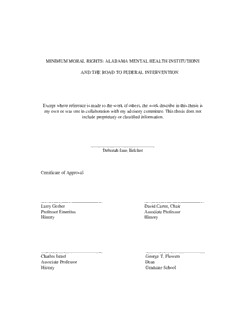
MINIMUM MORAL RIGHTS: ALABAMA MENTAL HEALTH INSTITUTIONS AND THE ROAD TO ... PDF
Preview MINIMUM MORAL RIGHTS: ALABAMA MENTAL HEALTH INSTITUTIONS AND THE ROAD TO ...
MINIMUM MORAL RIGHTS: ALABAMA MENTAL HEALTH INSTITUTIONS AND THE ROAD TO FEDERAL INTERVENTION Except where reference is made to the work of others, the work describe in this thesis is my own or was one in collaboration with my advisory committee. This thesis does not include proprietary or classified information. ____________________________ Deborah Jane Belcher Certificate of Approval ___________________________ __________________________ Larry Gerber David Carter, Chair Professor Emeritus Associate Professor History History ___________________________ __________________________ Charles Israel George T. Flowers Associate Professor Dean History Graduate School MINIMUM MORAL RIGHTS: ALABAMA MENTAL HEALTH INSTITUTIONS AND THE ROAD TO FEDERAL INTERVENTION Deborah Jane Belcher A Thesis Submitted to the Graduate Faculty of Auburn University in Partial Fulfillment of the Requirements for the Degree of Masters of Arts Auburn, Alabama December 19, 2008 MINIMUM MORAL RIGHTS: ALABAMA MENTAL HEALTH INSTITUTIONS AND THE ROAD TO FEDERAL INTERVENTION Deborah Jane Belcher Permission is granted to Auburn University to make copies of this thesis at its discretion, upon request of individuals or institutions and at their expense. The author reserves all publication rights __________________________________ Signature of Author ___________________________________ Date of Graduation iii VITA Deborah Jane Belcher was born in Mt. Clemons, Michigan. A graduate of Marshall Lab School in Huntington, West Virginia, Deborah attended Marshall University where she graduated with a Bachelor of Science in Art and Speech Education. After retiring from Delta Airlines, she enrolled at Auburn University to pursue a Masters of Arts in Modern American History. iv THESIS ABSTRACT MINIMUM MORAL RIGHTS: ALABAMA MENTAL HEALTH INSTITUTIONS AND THE ROAD TO FEDERAL INTERVENTION Deborah Jane Belcher Master of Arts, December 19, 2007 (B.S., Marshall University) 196 Typed Pages Directed by David Carter This thesis explores the history of the abuse to the patients in Alabama’s Mental Health Hospitals from 1860 to 1970. It addresses the social norms that encouraged the abuse, the legal aspects that endorsed the abuse, the political forces that compound the abuse, and the medical and administrative policies of the superintendents and their staff that executed the abuse. It concludes by relating the events that led to the landmark federal ruling in the Wyatt v. Stickney case that ended the abuse and guaranteed the patients their minimum moral rights. The significance of the case lies in the fact that it ensured all mentally disabled citizens throughout the nation the right to adequate medical treatment. v ACKNOWLEDGMENTS I would like to thank my committee, Drs. David Carter, Larry Gerber, and Charles Israel. I would also like to thank Mrs. Joyce Hicks and Dr. Dwayne Cox of the Special Collections and Archives Department of Auburn University and Dr. Norwood Kerr of the Alabama Department of Archives and History for their assistance in researching this project. A special thanks goes to Dr. Wayne Flynt for introducing me to the topic and for his assistance and support throughout the writing of the thesis. Of course, without the constant love, encouragement, and tenacity of my sister, Donna Robyn, I could have never completed the project. Finally, I would like to dedicate the thesis to the memory of my parents, Lucy Alice Jane (Hiser) and Henry Edison Belcher. vi Style manual used: Kate L. Turabian, A Manual for Writers of Term Papers, Theses, and Dissertations. 6th edition. Chicago: University of Chicago Press, 1996. Computer software used: Microsoft Word, 2003. vii TABLE OF CONTENTS LIST OF TABLES ...............................................................................................................x LIST OF FIGURES ........................................................................................................... xi CHAPTER I. INTRODUCTION .........................................................................................1 CHAPTER II. SOCIAL ISSUES AND THE RIGHT TO “MORAL TREATMENT” FROM THE CIVIL WAR TO WORLD WAR I ............................................................. 15 Introduction .......................................................................................................... 15 The Acts of 1852: The Establishment of the Alabama Insane Hospital .............. 20 Superintendent Peter Bryce: The Ethos of Moral Treatment ............................... 24 Plantation Labor as “Occupational Therapy” ...................................................... 34 “Separate but Equal” ............................................................................................ 39 Voice of the Inmates ............................................................................................ 42 Superintendent James Thomas Search: a Friend of African-American Inmates ....................................................................... 52 Contagious Afflictions: Prevalent Among African-Americans ........................... 58 Conclusion ........................................................................................................... 63 CHAPTER III. LEGAL ISSUES IMPACT THE RIGHT TO MORAL TREATMENT...................................................................... 64 Introduction .......................................................................................................... 64 “The Feebleminded”: “Idiots, Imbeciles and Morons”........................................ 67 Dr. William Dempsey Partlow: Eugenics as a Means of Cleansing Alabama’s Society of Mental Retardation ............................................... 71 James Sidney Tarwarter: “Nothing Wrong … that Money Won’t Cure” ............ 85 “Chaplain, how long is soon?”............................................................................. 90 The Division of Mental Hygiene ......................................................................... 97 CHAPTER IV. THE INTERSECTION OF FEDERAL COURTS AND MENTAL HEALTH ..............................................................................................104 Introduction ..........................................................................................................104 Marable v. Mental Health Board: Separate and Unequal ....................................109 Stonewall Boulet Stickney: Eradicating Past Moral Treatment Policies .............119 viii New Administrative Decisions ............................................................................123 Request for Adequate Funds ................................................................................124 Wyatt v. Stickney .................................................................................................127 Minimum Moral Standards ..................................................................................143 Johnson’s Decree Appealed by the Governor ......................................................145 Three Alabamians: Johnson, Stickney and Wallace ............................................146 CONCLUSION. MINIMUM STANDARDS AND MINIMUM MORAL RIGHTS .....148 Introduction ..........................................................................................................148 The Long Road to Redemption ............................................................................150 Conclusion ...........................................................................................................153 BIBLIOGRAPHY ............................................................................................................156 APPENDIX ......................................................................................................................166 ix LIST OF TABLES Table 1. Occupation of Patients Admitted from July 6, 1861 to October 1, 1870....................................................................................... 28 Table 2. Alleged Predisposing Cause of Insanity of Patients Admitted from July 6, 1861, to October 1, 1870 ........................................................ 29 Table 3. Form of Insanity of Patients Admitted from July 6, 1861, to October 1, 1870 ........................................................ 30 Table 4. States and Names of Asylums..................................................................... 33 Table 5. Total Number of Days’ Work Done by Patients in the Several Departments ......................................................................... 36 Table 6. Bill of the Fare ............................................................................................ 46 Table 7. The Number Employed Each Day at Partlow ............................................ 75 Table 8. Annual Report of the Bryce Hospital from October 1, 1951 through September 30, 1952 ............................................ 88 Table 9. Annual Report of the Searcy Hospital from October 1, 1951, through September 30, 1952 ........................................... 89 x
Description: